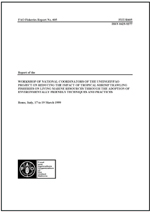 FAO
Fisheries Report No. 605
FAO
Fisheries Report No. 605FIIT/R605 (En)
ISSN 0429-9337
FOOD AND AGRICULTURE ORGANIZATION OF THE UNITED NATIONS
Rome, 1999
 FAO
Fisheries Report No. 605
FAO
Fisheries Report No. 605|
Copies of FAO publications can be requested from: Sales and Marketing Group Information Division FAO Viale delle Terme di Caracalla 00100 Rome, Italy E-mail: [email protected] Fax: (+39) 06 57053360 |
|
The designations employed and the presentation of the material in this information product do not imply the expression of any opinion whatsoever on the part of the Food and Agriculture Organization of the United Nations concerning the legal status of any country, territory, city or area or of its authorities, or concerning the delimitation of its frontiers or boundaries. |
ISBN 92-5-104315-9
All rights reserved. Reproduction and dissemination of material in this information product for educational or other non-commercial purposes are authorized without any prior written permission from the copyright holders provided the source is fully acknowledged. Reproduction of material in this information product for resale or other commercial purposes is prohibited without written permission of the copyright holders. Applications for such permission should be addressed to the Chief, Publishing Management Service, Information Division, FAO, Viale delle Terme di Caracalla, 00100 Rome, Italy or by e-mail to [email protected]
© FAO 1999
PREPARATION OF THIS DOCUMENT
After a preparatory process which was initiated in 1995 by the Fisheries Department of FAO, the Global Environmental Facility (GEF) of the United Nations Environment Programme (UNEP) in December 1998 decided to fund a Project Development and Preparation Facility (PDF) of a project titled "Reducing the Impact of Tropical ShrimpTrawling Fisheries on Living Marine Resources Through the Adoption of Environmentally Friendly Techniques and Practices". In the process leading up to the project approval, several countries with important shrimp fisheries in tropical regions were invited to participate in the project. Thirteen countries stated their interest and each government, upon request from FAO, appointed a person to become a National Coordinator for activities to be undertaken during the Project Development and Preparation Phase. With the purpose of familiarizing the National Coordinators with the project concept and have first discussions on problems related to shrimp fisheries encountered in each country, a "kick off" Workshop was arranged at FAO Headquarters on from 17 to19 March 1999. The National Coordinators had prepared and presented to the Workshop brief national reports describing the shrimp fisheries in their country. The FAO staff had produced background documents that were presented and used as background for discussions. This report was produced in draft by the FAO Secretariat after the meeting. Information was extracted from the national reports and is presented here in a common format developed by FAO. The draft report was sent to the National Coordinators for review and correction. This final version is a result of such a process and can therefore be considered as the approved Workshop Report.
Distribution:
Workshop participants
UNEP/GEF Focal Points in participating countries
FAO Representatives in participating countries
Fisheries Officers in FAO Regional and Subregional Offices
|
FAO.
Report of the Workshop of National Coordinators of the UNEP/GEF/FAO Project on ABSTRACT To initiate the preparatory phase of a UNEP/GEF/FAO project aimed at reducing the impact of tropical shrimp trawling fisheries on living marine resources through the adoption of environmentally friendly techniques and practices a Workshop was organized by FAO at their Headquarters in Rome from 17 to 19 March 1999. This report summarizes the outcome of this Workshop which was attended by FAO staff and 12 National Coordinators. The National Coordinators from 12 counties: Bahrain, Bangladesh, Cameroon, Columbia, Costa Rica, Cuba, Indonesia, Nigeria, the Philippines, Tanzania, Trinidad and Tobago, Venezuela, had been appointed by their respective governments. The workshop reviewed the situation with regard to problems associated with shrimp exploitation as well as the multi-sectoral structure in place for consultation on such issues in each country. It was generally agreed that the present exploitation pattern for shrimp in most countries is non-sustainable, mainly because of capture of juvenile fish and overfishing. A priority issue, however, to be addressed and hopefully solved by such a project, is to reduce capture of juveniles of commercially important food fishes. It was recognized that any introduction of new environmentally friendly techniques and practices depends to a large extent on the acceptance by the fishing industry of any such devices, technologies or regulations. The participation of affected stakeholders should therefore be given priority in all the phases of project implementation. The workshop agreed on follow-up activities, which included preparation of detailed reports about the shrimp fisheries in each country, and venues for four regional workshops to be arranged in December 1999/January 2000. |
2. BACKGROUND AND CONTENT OF THE PROJECT
5. SUMMARY OF THE SHRIMP FISHERY IN EACH COUNTRY
6. NATIONAL MULTI-SECTORAL STRUCTURES FOR CONSULTATIONS
7. PRELIMINARY ASSESSMENT OF PROJECT PRIORITIES
8. FORMAT AND CONTENT OF NATIONAL REPORTS
APPENDIXES
APPENDIX 1. List of Participants
APPENDIX 2. The Role of the Global Environment Facility (GEF)
in International Waters
APPENDIX 3. Summary of the Shrimp Fishery in the 12 Countries
APPENDIX 4. Suggested Format of National Reports
APPENDIX 5. Incidental Catch, By-catch and Discard in Shrimp Trawling Fisheries - Checklist